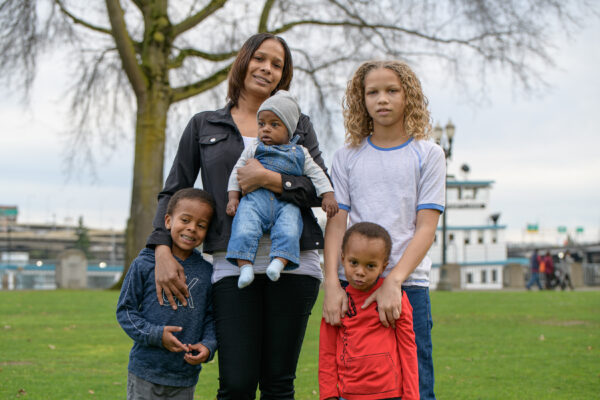When my oldest son was about to turn three years old, I knew I needed to make changes in my life. I wanted a better future for us than the one we were heading toward, but I wasn’t sure how to make things different. Instead of making the positive changes I dreamt of, like figuring out how to go back to school, I made some terrible choices that landed me in jail, facing a long prison sentence.
Three days after I went to jail, I learned I was pregnant with my second child. I was heartsick for my baby and my toddler. What would happen to them while their mother was incarcerated?
Thankfully, my parents agreed to take care of my kids, so I knew they would be with people who knew them and loved them. Can you imagine being a grandparent and taking on full-time parenting of a 3-year-old and an infant? I knew that I was lucky to have their support, most kids whose moms are incarcerated have to go to foster care. But I still worried about how I could be part of my children’s lives while I was in prison.
Even before I was transferred to the state prison, I learned there was a program there called the Family Preservation Project for incarcerated moms, their kids, and caretakers on the outside like my parents. I sent letter after letter to prison officials, asking them to let me in the program. I was very persistent, and it paid off when I was accepted.
Through the program, I was able to have regular visits with my children in a special, kid-friendly space rather than the crowded visitation room. I also met regularly with the other mothers, women who understood what I was going through. Together, we had access to supplies to write our kids letters and cards, and funds to make phone or video calls to them. This helped us stay present in our children’s lives and reduce the trauma they were experiencing.
Not only did the program help me remain connected to my kids, I also got the tools I needed to take accountability for my mistakes and make progress toward the life I dreamt of. I completed my first college course. I completed financial literacy training so I could rebuild my credit. And importantly, I participated in facilitated, therapeutic meetings with my family members that promoted so much growth and healing for us. These steps gave me hope for the future, and helped me stay focused on the things that would make me the most successful when I returned home.
Since my release, I have stayed connected with the program through the alumni network. The other mothers, our kids, the caretakers, and the staff -- we have each other’s backs. We help newly released moms navigate life outside of prison, so they can also be successful.
Thanks to the tools and skills I learned, I have been able to train to be a doula. I know first-hand what a difference it can make when a mother has support, and I am excited to start my new career soon.
There is no doubt about the need for programs like the Family Preservation Project. There are nearly 58,000 children in Oregon who have had an incarcerated parent, and 80 percent of women who are incarcerated are mothers. Kids who are able to maintain their relationship with their incarcerated parent do better in school and have fewer health and behavioral problems. And incarcerated parents who are allowed to maintain relationships with their children are less likely to re-offend than those who don’t have this opportunity.
Oregon lawmakers are now considering whether to continue the Family Preservation Project. SB 720 would provide funding to continue this vital program that strengthens families and reduces trauma for children. This program made a huge difference to my family, and I urge legislators to vote YES on SB 720.
Note: This blog was originally posted in February 2020. It has been updated to include the current bill number.

